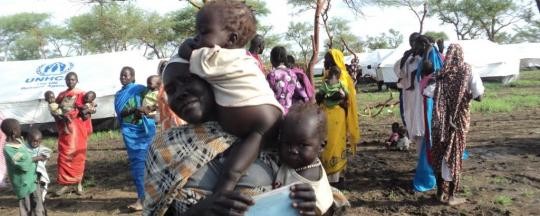Supply line threatened for 130,000 Sudanese refugees

Sudanese refugees from Blue Nile in eastern Upper Nile State face hunger owing to a potential ‘prolonged disruption’ of food supply to the region, the UN Refugee Agency (UNHCR) spokesman said in Geneva on Friday.
The approximately 130,000 refugees in Maban County fled from Sudan’s Blue Nile state since 2011, where SPLA-N is battling the Sudanese army. With ongoing conflict now also in Upper Nile, the refugees are trapped between two conflicts.
World Food Programme (WFP) normally prepositions food during the first quarter of the year in preparation for the rainy season, making use of river barges along the Nile. But fighting in Malakal and other transport hubs has made this impossible.
"Unless food is delivered immediately, the health and nutrition status of refugees will become severely compromised," said UNHCR spokesman Adrian Edwards. "We are in the dry season, the traditional hunger gap, when refugees are unable to grow food to supplement the WFP rations.”
An alternative supply route through Ethiopia is also problematic, with UNCR citing “general insecurity and border restrictions along supply corridors.” Roads are expected to become impassable within the next few months.
OCHA, the UN coordinating office, disclosed in a report 6 March, “Distribution of reduced 10-day rations is on-going” to the refugees in Maban County, using existing stocks in the county, but noted that these rations cover only about “25 per cent of refugees’ energy requirements.”
According to Edwards, in recent weeks there had been several cases of severe malnutrition among very young children in the refugee camps, which is symptomatic of protein deficiency.
UNHCR also pointed out that the newly displaced people elsewhere in Upper Nile state “face even worse conditions.” Many in areas such as Fashoda, Melut or Nasser have not received food assistance either.
More clashes between Maban community and Blue Nile refugees (6 March)
10% of children in Malakal ‘severely’ malnourished (3 March)
File photo: Refugee women in Jamam camp, June 2012 (Radio Tamazuj)